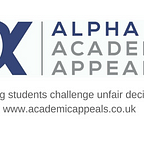Writing a winning academic appeal or complaint: prove it
In this article, we explore the significance of proof and evidence in writing successful academic appeals and complaints.
The importance of proof and evidence
When making an academic appeal or complaint, or responding to an allegation of academic misconduct, it is vital that you don’t just make statements but that you actually prove them.
A fundamental tenet in law is that he who asserts must prove. For example, if you claim that you were suffering from mental health problems when sitting an exam, then the onus is on you to prove this. If the university claims that you cheated in an exam, then it is for them to prove it.
Imagine that the reader is sceptical and wants an assurance that your contention is true. How can you persuade them of its veracity?
What constitutes proof?
Proof is anything that evidences a fact or shows the truth of a statement.
Examples of evidence include:
· Text or WhatsApp messages
· Social media (Facebook, Twitter, Snapchat etc)
· Letters
· CCTV footage
· Audio recordings
· Expert evidence
· Witness statements (signed and dated)
But these aren’t the only forms of evidence. Crucial in the context of appeals and complaints is to think broadly and creatively.
Let’s now consider some specific examples illustrating how adequate evidence can assist a case.
Proving extenuating circumstances: doctor’s note
Many students appeal on the grounds of extenuating circumstances. These might be bereavement, in which case a death certificate could be submitted as evidence.
They might, however, be a little more complicated. Imagine that a student was struggling with anxiety at the time of their assessment. They did not apply for extenuating circumstances at the time but are now appealing on the grounds that they had extenuating circumstances which affected their academic performance.
In this case, medical evidence is necessary. The student is likely to obtain a letter from a GP that clarifies that they showed symptoms of anxiety at the time of the assessment.
In our experience, however, this is not strong enough. Each university’s approach to extenuating circumstances differs but usually they require more. For instance, they need evidence that the student could not engage with the extenuating circumstances procedure.
While the GP’s evidence must be clinically accurate, ensure that it addresses the requirements in the ground of appeal, such as:
· What the extenuating circumstances were.
· How they affected you (ask the GP to explain the effects rather than saying that you merely ‘reported’ symptoms).
· The adverse effect on your ability to study.
· The fact that they made you unable to assess whether you were fit to sit the assessment or engage with the extenuating circumstances procedure.
The maths student and expert evidence
In certain cases, expert evidence can be helpful. There are many types of expert evidence, such as forensic linguistics, clinical psychologists and IT experts.
Recently, we helped a maths student accused of plagiarism. His exam script contained calculations that were similar to another student’s, and the university claimed that he had copied them. The student was innocent.
We advised him to instruct a maths expert. The expert was asked to comment on whether the students’ answers were suspiciously similar, whether any differences were noteworthy and whether the student is likely to have engaged in academic misconduct.
The expert found that, on the balance of probabilities, there was insufficient evidence to find that the student had plagiarised. The university conceded, dropping the allegation.
The downside — aside form the cost of expert evidence — is that the expert’s evidence may not be favourable to you, in which case you should not use it.
If you do instruct an expert, it is important to give them clear and non-leading instructions on the issues that you want them to address. Guide your expert to make the best use of their knowledge.
The acting student and metadata: how technology can help you
An expert is not the only way of proving your case. Again, it is important that you think imaginatively to prove your point.
We assisted an acting student whose final assessment was failed due to the university claiming that she did not submit both elements of her work by the deadline. The student had to upload two videos to YouTube and submit the links to them.
When she came to appeal the decision, the student submitted two date-stamped images to show that the YouTube videos had been uploaded by the deadline.
The university, however, was not convinced. They rejected her two appeals.
After some research, we found software that allowed one to view the exact upload time — and not just the date — of the YouTube videos. Extracting the metadata in this way was conclusive evidence that both videos were uploaded before the 4pm cut-off.
The main takeaway
Unsupported assertions may be disbelieved.
Take a broad, creative and thorough approach to your case to produce compelling, evidence-based arguments.
If you want our specialist help with your appeal or complaint, just call us now on 0800 368 9230 or complete the online form.
